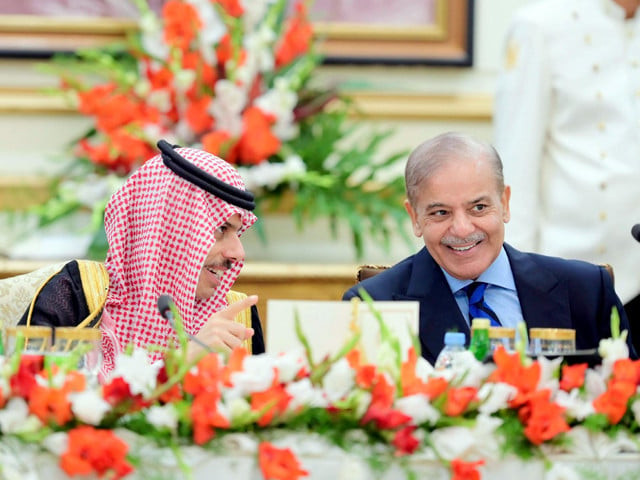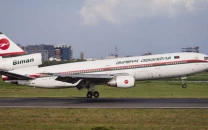Pakistan sweetens terms to lure Saudi investment
Assures swift repatriation of profits for Saudi investors, ensuring a hassle-free process

Pakistan has presented the enticing prospect of highly profitable returns to attract Saudi investment, with projected rates ranging from an appealing 14% to an astounding 50%. Additionally, Pakistan has assured priority in the repatriation of profits without any hindrances.
According to government sources involved in these discussions, the indicated returns on Saudi investment are expected to allow the Kingdom to recoup its invested capital within a period of three to nine years, depending on the nature of the project.
Pakistan aims to advance the Saudi Arabia investment initiative during the April 27-28 visit of Prime Minister Shehbaz Sharif, who will be accompanied by a team from the Special Investment Facilitation Council (SIFC).
During their two-day visit to Pakistan, the Saudi delegation asked maximum questions about projects in the areas of agriculture, mining and Diamer Basha dam, said the sources. These are the areas where the government has indicated maximum returns on the investment.
Although initially eying on a $25 billion bonanza, Pakistan has now adjusted its expectations to a $5 billion investment by June 2025.
One of the concerns of Saudi Arabia was that Pakistan was withholding the repatriation of profits due to external sector liquidity constraints. However, Pakistan assured that Saudi investors would get priority in repatriation of profits, said the sources.
Prime Minister Shehbaz Sharif has already given instructions to the State Bank of Pakistan (SBP) to give Saudi Arabian companies preference in repatriation of the profits.
Pakistan allowed $694 million repatriation of the profits during the first eight months of this fiscal year, which was more than double compared to the previous fiscal year but it was still $900 million less than the pre-crisis period.
Despite a liberal and attractive investment regime, Pakistan’s annual foreign direct investment has remained in the range of $1.5 billion to $2 billion. It had earlier offered special incentives to Beijing under the China-Pakistan Economic Corridor (CPEC) that resulted in a total of $25 billion Chinese inflow, mostly in the shape of loans and a component of investment
While appearing at Express News programme The Review –Pakistan’s only dedicated show on economic affairs – Bilal Azhar Kayani the Member National Assembly of the PML-N, said that the indicated Internal Rate of Returns (IRR) are based on the assumption of the potential investments.
He said that these indicative numbers should not be construed as offers, as the actual returns on the investments would be decided during the technical negotiations.
The maximum 50% return on the investment has been indicated for the Greenfield Mine Development, Khuzdar, project, which is said to be the third largest mining project after Reko Diq and Thar coal, according to the sources.
The government has estimated an initial investment of $154 million and with the 50% IRR, the payback period is projected at five years.
Pakistan has also indicated higher returns on investment in the agriculture sector. It has offered Saudi Arabia to set up a cattle farm in Punjab for 30,000 animals with an annual production of six thousand tons of meat. The initial indicated size of investment is over $25 million and the payback period is just three years with a 34% return on the investment.
The sources said that Saudi Arabia was also interested in getting agricultural land on lease but the details have yet to be finalized. Pakistan pitched Saudi Arabia to acquire 50,000 acres of land on lease for corporate farming.
A government official said that the Saudi Agricultural and Livestock Investment Company (SALIC) showed interest in the project and a memorandum of understanding could be signed during the next week's visit of Prime Minister Shehbaz Sharif to the Kingdom.
The government has indicated a 22% return on the investment in corporate farming with a payback period of only six years, said the sources. The sources said that due to the lack of availability of water corporate farming cannot begin for at least one and a half year.
The profitability for the majority of the projects is estimated in the range of 14% to 15% with some falling in the profitability of 19-20%, said the sources.
The semiconductor development and Chip packaging project is also pitched for Saudi investment of $270 million with an indicated profitability of 17%, said the sources. This project will have a payback period of seven years, they added.
The sources said that Pakistan has indicated that it would dilute 25% shares of the Reko Diq project to Saudi Arabia, which are currently held by three federal government-owned companies. The project is highly capital-intensive.
A $2 billion project for a strategic rail link development connecting Reko Diq mines with Gwadar port has also been offered to Saudi Arabia.
Pakistan has indicated a 20% return on around $1.5 billion investment in the development of the Iron Ore Mining and Steel Mills Complex at Chiniot, Punjab. The project will have a payback period of 9 years, said the sources.
Despite surplus electricity, the government has offered Saudi Arabia to set up a 600MW Solar Park at Kot Adu, Punjab with a $300 million equity investment. The indicated return on the investment is 13-14%, which Pakistani authorities said can be further negotiated.
The government also wants Saudi investment in a 1320 MW Thar Coal power project on a cost-plus tariff basis despite the country not needing any new investment in the power sector. There will be guaranteed dispatch and a 14% return over the investment cost, said the sources. The project will also get tax exemption and protection from political force majeure.
A $680 million transmission line project has also been offered to Saudi Arabia with a 14% return on investment and a payback period of seven years, said the sources.



















COMMENTS
Comments are moderated and generally will be posted if they are on-topic and not abusive.
For more information, please see our Comments FAQ